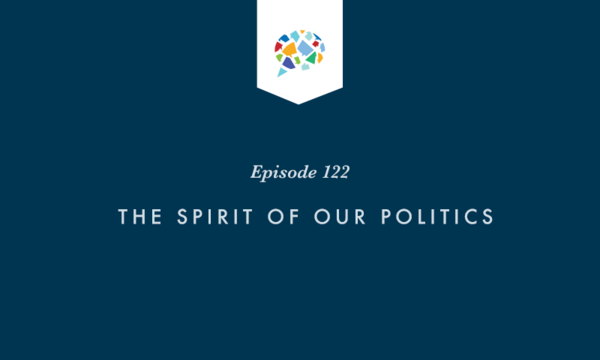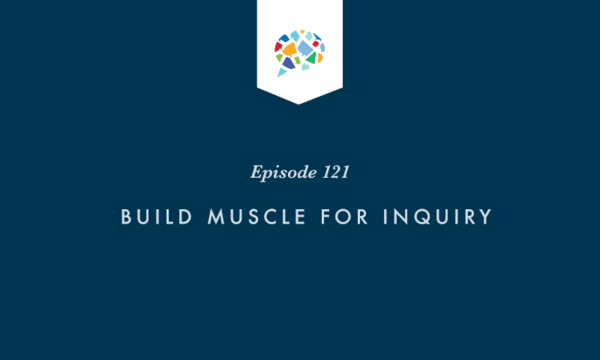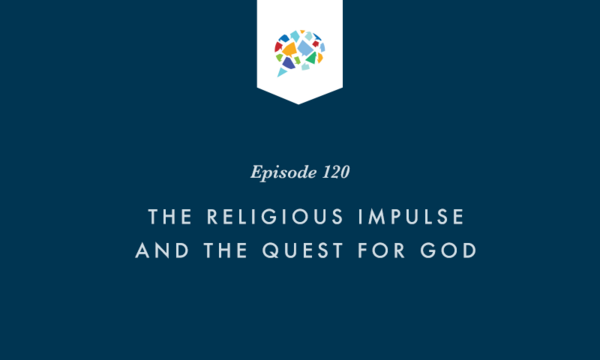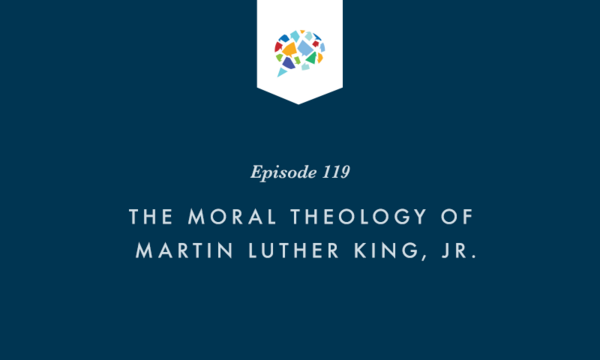
We’re trying something new on the podcast today. Rick draws from Psalm 46 to help us reflect on fears we are experiencing with respect to political issues and engagement. Remembering that God is “a refuge” and “a help” and “a hope” has been vital for God’s people throughout history, and these truths provide needed perspective for us today in our own cultural moment.
Transcript
Rick Langer: Welcome to the Winsome Conviction Podcast. My name is Rick Langer and I'm your host for this episode of the Winsome Conviction Podcast. I'm also Professor at Biola University and the Co-Director of the Winsome Conviction Project, along with my friend Tim Muehlhoff. And we started this project to help address the problems of incivility, polarization, kind of alienation, within the public space, but also within churches. So many times you're finding division as not just a thing between the Christian world and the non-Christian world, but is a thing that has become very common within churches and even within families. So we're concerned about that and doing things that help make us just a little bit better in communicating across differences in convictions, beliefs, and the things that we hold most dear.
Now, one of the things that it seems like people hold most dear these ways is their political convictions and we've talked at other times and places about why politics is so important to us. But one of the side effects I think, that has concerned me is that sometimes as politics gets big, God gets just a little bit smaller. In other words, we get moved more by our politics than we do by God. We're more worried about political outcomes because we're afraid they will affect our lives more than what we do with God. And in all of these ways, I think politics has sometimes gotten kind of front and center and God has become displaced.
So I'd like to take a few minutes today in this podcast to just talk a little bit about making God big again. And a great passage to go to if you want to do this in your own devotional life is Psalm 46. It's a passage made famous by Martin Luther in the hymn, mighty fortress is our God. But it's also just a wonderful passage to think about from a political context, or in terms of God relative to the nation's, relative to politics.
And let me just read a few verses from it and make a couple comments on that and the reason for this is because I think part of why politics has become so big is because right now we have a lot of fear related to political issues and the outcomes of those. Sometimes it's fear of external things. Sometimes these are fears about the way our country is going and how that's dismantling values that we hold dear, but we become afraid and we rarely do our best thinking and we rarely do our best speaking to others when we find fear. And one of the things that Psalm 46 is so good at doing is kind of putting our fears back in perspective by making God seem just a little bit bigger.
So, the Psalmist writes, "God is our refuge and strength, a very present help in need, and therefore we will not fear. Though the earth gives way, though the mountains be moved to the heart of the sea, though the waters roar in form and the mountains tremble their swelling. God is in the midst of her and she will not be moved. God will help her, when morning dawns. The nation's rage. The kingdom's totter. He utters his voice and the earth melts. The Lord of Host though is with us. The God of Jacob is our fortress. Come behold the works of the Lord. He's brought desolation on earth. He makes wars to cease. He breaks the bow and shatters the spear. He burns the chariots with fire." And then the psalmist encourages "To be still and know that I am God. I will be exalted among the nations. I will be exalted in the earth. The Lord of hosts is with us. The God of Jacob is our fortress."
And you can see that this is a Psalm written to kind of give confidence, give courage to people who find themselves in scary situations, find themselves in places of natural or political disasters. Both are described when the earth is quaking in the nations are raging. This Psalm promises that God will keep us and I think it's a good thing to kind of draw back into our hearts in the midst of the conflicts we see here.
And let me just make an observation right at the outset. The first thing that says about God is, He is a refuge. It's a very present help and trouble. Now refuges are interesting things. They're the thing you run into when the wolves are coming or whoever it is, you run into it and shut the door. And the bottom line is, a refuge only works when you abide within it. So, if God is our refuge, we need to abide with Him, if we want to experience all the benefits that Psalms promises.
And if we're going to do that, we kind of have to decide that we're going to abide with Him, no matter what. Even if it doesn't seem to pay off at a moment, we plan on abiding with Him. And here's the thing about God's rescue and I think this is important for us as we think about our nation and we doubt the outcomes, we wonder where it's going. What's going to happen? Sometimes God rescues us from the things we fear, and sometimes he rescues us through the things we fear, and we must make up our mind to abide with Him no matter which He chooses to do.
So sometimes great general like the Assyrian Sennacherib is at the gates and God strikes downs his armies, and we are released from that threat and we have our freedom. Sometimes it's Nebuchadnezzar that's at the gates, and Nebuchadnezzar is allowed to strike down the gates and tear down the walls and take the people of Israel off into exile.
But at all times, God ultimately saved his people, either from exile, or through it. I would like to say it's really helpful to get that big picture thing, where you have a sense of saying, no matter the outcome from nation, and this is not to say we shouldn't care about our nation, but it is to say that we should at some point say, the most important thing is not our nation, but our God. And that we have confidence that even if things go bad, whether they go bad or well with our nation, whether the Sennacherib is chased away or the Nebuchadnezzar comes through the gates, God will not, and has not, abandoned us. He is still working his project. And this is repeated over and over again in scripture.
Job says, "Though he's slay me, yet I will hope in him." Habakkuk says, "Though the fig tree should not blossom, there be no fruit on the vine. The olive failed. The field yield no fruit, no food. The flock be cut off from the fold. Yet I will rejoice in the Lord. I will take joy in the God of my salvation." People are saying, "No matter what, God, I'm with you."
Shadrach, Meshach, and Abednego answer to Nebuchadnezzar. You know, "You put us into the flaming fire if it be so our God whom we serve is able to deliver us from the burning fiery furnace and He will deliver us out of your hand. But if not, be it known, no king that we will not serve your gods or worship the golden image that you've set up." And we have a posture that modeled for us there of just simply saying, whatever the outcome, I'm going to abide with God.
And I'm worried that in our current political environment we've kind of departed from that sense and we kind of say, "I'm happy to play by kind of God's rules. I'm happy to do God's things, as long as it's working. And as soon as it looks like the other side is winning, I want to do whatever it takes to win. I'll vote whoever it takes to vote for in order to get me. I'll get the bully who's on my side. I'll get the bully who's on their side, torn down, whatever the battle is." And we act as if God only works if we see Him working for us and keeping us from the things we fear.
And I would just like to point out that oftentimes God keeps us through the things we fear and we should just make up our mind at the outset that they will work as hard as we possibly can for the things we see and know to be right. We will nonetheless trust that God will do what He will do, and it won't require us doing things we should never do, in order to get God's will done. So we need to abide and God as a refuge.
The other thing is to remember that God is our help. "In the midst of her, she shall, the city will not be moved. God will help her when morning dawns," says verse five. And the things that are going on all around the person here who needs the help, the nations are raging the mountains and Caesar in turmoil. Nature's kind of melting down. You feel peace not because your fears are small in this passage, but because God is big. He seems to be bigger than all of your concerns. Here's an analogy of this.
I remember taking my son when he was young, maybe three years old, down to the breakwater at Dana Point. And it's got these huge boulders that are the size of an automobile practically. And so it's hard to walk along those. I'm tall, so it's easier for me than for a lot of people, but there's a lot of these gaps and dips and things like that. And so for a three-year-old, it's pretty hard to do that walking. You got to be careful. So I told Mark to be sure to hold my hand tightly and so he took my finger. He couldn't get really get his hand around my hand, but he grabbed my finger with his death grip and we start walking along the breakwater there and kind of up and down through the cracks and along the tops. And all of a sudden a big wave smashes on the rocks right in front of us. And we got a little bit wet from the spray, but it was far enough away that we didn't get doused.
But when it hit, the sound of it, just scared Mark like crazy. And you know what he did? He let go of my finger. His hands just opened up in fear and shock and he suddenly let go of me. And here's a bit of good news.
The most important thing in this whole interaction between Mark and I, we walked along the rocks was not that he was holding onto my finger so tightly, but I was holding onto him so tightly because honestly, the most important thing, if he got washed away, his hand wouldn't have been able to hold my finger no matter what. But my hand was able to hold him and I think that's the picture we need to have with God. We hold onto His finger in the midst of things we're doing, but the thing we most want to remember is He's holding onto us.
The other thing that comes up in this passage is I think a sense of God being our hope, that things will somehow work out well. The nations will be stilled, ultimately. The warring will slow down or stop. And there's a clear sense in the Psalmist that he just knows that one day God will be exalted among all the nations. They will, all things be set back in their proper place.
And the thing that we need to remember is that we're part of a great big story. Sometimes we want each little bit of what we're doing to work out well; each election, each conversation. And we want to have everything just work out. And it's kind of like we want the story of our lives, we want it to be a blog post where it all gets wrapped up in 700 words. And the reality is, God's pretty much writing a Russian novel with our lives. Lots of chapters. Some of them end well. Some of them end badly. But there's a sense ultimately that the story that God is writing, even more so than even our individual story, but the story that God is writing, is not a tragedy, but a comedy. It ends not in a funeral but a wedding. There may be a funeral in the middle of the story. There may be hard things that happened. In fact, there were for Jesus. Remember we had a funeral. We had a burial, but then we also had a resurrection.
And it's the same way for the story of the church. We go through all kinds of turmoil as a church. We go through that as individuals. But we look forward to a day when we are united with Jesus and we will actually be there at the wedding feast of the Lamb.
Our story ends in our wedding, not in the funeral. So panic ultimately should really have no place among us. We've read the end of the book. We know how this story ends. And the bottom line is that evangelical discourse, I think in many times I feel like as I watch how we talk about political issues, there's an apocalyptic language that we use and we talk like we're a sandcastle on the beach and the tide is rising and we're about to be washed away. And if you don't give $50 to our organization will be swept off into an ocean of secularism.
But we know that that's not actually how the story ends. The church is not the sandcastle. It's the rock on which all waves will crash. The very gates of hell won't prevail against it. We're not a bug on the windshield. We're the windshield. In the end, we will be walking down the aisle to meet the groom, not moldering in a grave. And there's really no reason for us to panic. We need simply to persist, to persevere, to trust, and to abide.
So, a few lessons just to walk away with this. I would really encourage us to cultivate deep convictions, not just about social issues or ethical issues or political issues, but deep convictions about God's faithfulness to us, God's faithfulness in terms of providentially arranging the affairs of men and nations, and that we would really trust that whatever chapter He's written us into, is a chapter that's part of a very good book, even if the particular moment and chapter we're in doesn't feel right.
Another thing that I think is really important is to give room for people, friends, colleagues, family members, to disagree. And we talk a lot about disagreeing, achieving disagreement. And by that I mean simply being able to understand the other's position and where it comes from.
And one of the things that keeps us from doing that is being so concerned that things have to work out the way we see it, and therefore this position, at this moment, must be right and therefore it must carry the day. But the bottom line is, sometimes we're wrong. Sometimes we are absolutely right but that isn't what God's going to be accomplishing in any moment.
And let me just say that in all of these cases, we want to be faithful to speak and to articulate our convictions, but at the same time, to trust God to accomplish his purposes in the time and place that He's put us.
And my hope is that in doing so, we can kind of get politics back into the right size and God back into the right size as well. Our God would become bigger, our politics would become smaller, and as a result we'd find much more peace, much less fear, and therefore would be standing on a ground that allow us to have much better conversations and interactions with others who may or may not agree with us.
So, just a few thoughts on making God big, making politics not so much little, but just back in their right size. And I am grateful for you joining us on the Winsome Conviction Podcast. We encourage you to subscribe, either at Apple Podcast or Google, Spotify, wherever it is that you get your podcast. And check us out as well, on the winsomeconviction.com website. You'll find lots of resources there for those who'd love to just make the world a little bit of a better place when it comes to the kind of conversations we're able to have in the public square, in the church, and even within our families.
 Biola University
Biola University



